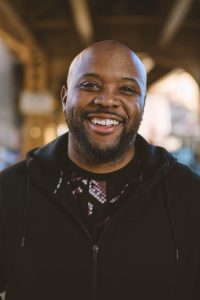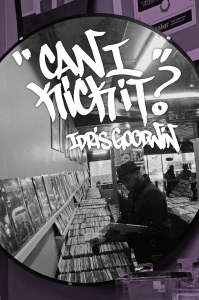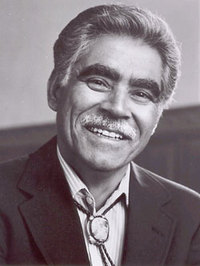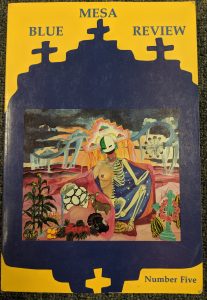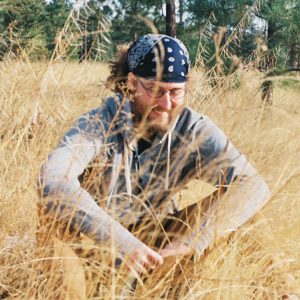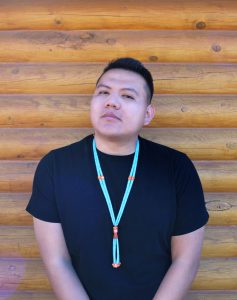Next week, Blue Mesa Review will be roadtripping the Southwest from Albuquerque to San Antonio for the Association of Writers & Writing Programs Conference. In anticipation of AWP, the BMR staff has been scoping out the panels we’re most looking forward to checking out when we’re not working our table (T1914) at the bookfair — check back next Tuesday for our incoming editors’ lists of panels!
Tori Cárdenas, Editor in Chief
F234: Pushing Boundary: Trans and Genderqueer Poets Beyond the Page
F173: New Poetry from Graywolf Press
As a newly out transmasculine poet who is about to graduate, I’m nervous. On the one hand, I feel more connected to poetry as a genre/channel for queerness and emotion and love than I ever have before. On the other, I’m unsure about work after my MFA (what else is new?). Except now, I also need work with health insurance (see previous parenthetical) that has trans benefits so I can stay on my HRT. So, nervous almost covers it.
However, I’m hella excited for Pushing Boundary: Trans and Genderqueer Poets Beyond the Page, a panel of trans/NB/genderqueer poets who are out there DOING THE DAMN THING: writing, working, and creating, in spite of all this daunting life stuff. I’ll also be reading with a whole squad of new queer friends that I can’t wait to meet! We’ll be at the Esperanza Peace and Justice Center (922 San Pedro Ave. San Antonio, TX 78212) from 7-10 pm on Friday March 6th, raising our #QueerVoices!
I’ll also be at F173: New Poetry from Graywolf Press, clutching copies of “Postcolonial Love Poem” and “Homie,” and crying queer tears.
Ari McGuirk, Managing Editor
R200: From Darkness to Light: Unearthing Family Secrets in Memoir
I’m fortunate to have a family that supports me writing about them. Since I started writing my memoir a little over a year ago, I’ve been something of an investigator digging up mysteries surrounding my parents and my adoption. Writing this book has been an exhumation—several of its key characters have been dead since I was a teenager. I’ve learned secrets that have been kept from me for decades, most of them unpleasant. Determining which are necessary to write and how to render them has been a difficult process, one I’m still working through. This panel sounds like an incredible resource for memoirists, like me, who are navigating the ethical and moral minefields that accompany this kind of writing and reflecting on the secrets we’ve unearthed with honesty and empathy.
Mitch Marty, Associate Editor
R242: Five Writers Walk into a Bar: Using Humor in Fiction
F140: Make Yourself at Home: Writing the Familiar from a Distance
S274: You’ve Got It Wrong: Writing against Misperceptions
This will be my third trek to AWP, and I’ve finally learned that there’s no way that I can attend all the events I’d like to, so this year I’ve narrowed it down to one panel each day that I’d like to hit when I’m not tabling for Blue Mesa Review, or wandering the Book Fair or San Antonio River Walk.
On Thursday, I’m looking forward to Five Writers Walk into a Bar: Using Humor in Fiction (Cara Blue Adams, Danielle Evans, Kristen Arnett, Jennine Capó Crucet, Courtney Maum). Of late, most of my nonfiction has been an act of juggling heavy personal history with a sense of levity and lightness, so this panel seems a perfect way to mesh pre-AWP therapy with post-AWP writing (and I’ll be honest, Mostly Dead Things was my favorite book in 2019, in part because of the way Kristen Arnett balances heaviness and humor). My writing is also largely centered in rural Southwestern Wisconsin, and I’ve given to a lot of thought about setting from my current perch in the middle of the desert. Friday I’ll be checking out Make Yourself at Home: Writing the Familiar from a Distance (Jennine Capó Crucet, Helena Maria Viramontes, Laura van den Berg, Tiphanie Yanique, and Manuel Muñoz). Last but not least, I’m excited to check out You’ve Got It Wrong: Writing against Misperceptions (Marie Mutsuki Mockett, Carmen Maria Machado, Ander Monson, Paul Lisicky, Fiona McCrae) on Saturday.
Mario Montoya, Fiction Editor
R157: AWP Program Directors’ Southwest Council
R285: Disabled and D/deaf Writers Caucus
At AWP 2020, there’s a lot to engage. Every day is action-packed and eventful. So, with that in mind, I’ll limit my commentary to the first day. First, I plan on sitting in with the AWP Program Directors’ Southwest Council, a gathering of badass writers from the states of KS, MS, NV, NM, TX and UT. Since I’m a NMer, this might be a great place to make connections. Also, as a writer who uses a wheelchair, I’m looking forward to the Disabled and D/deaf Writers Caucus, which gives is a space for those who are disabled or living with chronic illness to network and discuss all things identity, writing, and teaching.
If you’ll be attending AWP 2020 next week, remember to stop by Table 1914 at the bookfair to meet the current and incoming BMR staff, see our latest issue, pick up some swag, and find out which phenomenal authors we have lined up for our summer contest judges. See you in San Antonio!
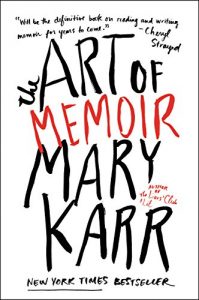 All this changed for me last fall, when I read The Art of Memoir by Mary Karr. Something inside me has always resisted the idea of books about writing books, but this one changed my mind. I read the whole thing—cover to cover—pen in hand, underlining a quarter of the text, and about 75% of the chapter, Dealing with Beloveds (On and Off the Page). Karr shares her process for managing her loved ones’ feelings about being included in her work in generous and thoughtful steps, 11 of them to be exact! Two of my favorites include a Herbert Selby quote, “If you’re writing about someone you hate, do it with great love,” and never claim authority over how people truly felt. Karr also recommends sharing parts of your work with the subjects on the page, especially if you think it “might make them wince.”
All this changed for me last fall, when I read The Art of Memoir by Mary Karr. Something inside me has always resisted the idea of books about writing books, but this one changed my mind. I read the whole thing—cover to cover—pen in hand, underlining a quarter of the text, and about 75% of the chapter, Dealing with Beloveds (On and Off the Page). Karr shares her process for managing her loved ones’ feelings about being included in her work in generous and thoughtful steps, 11 of them to be exact! Two of my favorites include a Herbert Selby quote, “If you’re writing about someone you hate, do it with great love,” and never claim authority over how people truly felt. Karr also recommends sharing parts of your work with the subjects on the page, especially if you think it “might make them wince.”